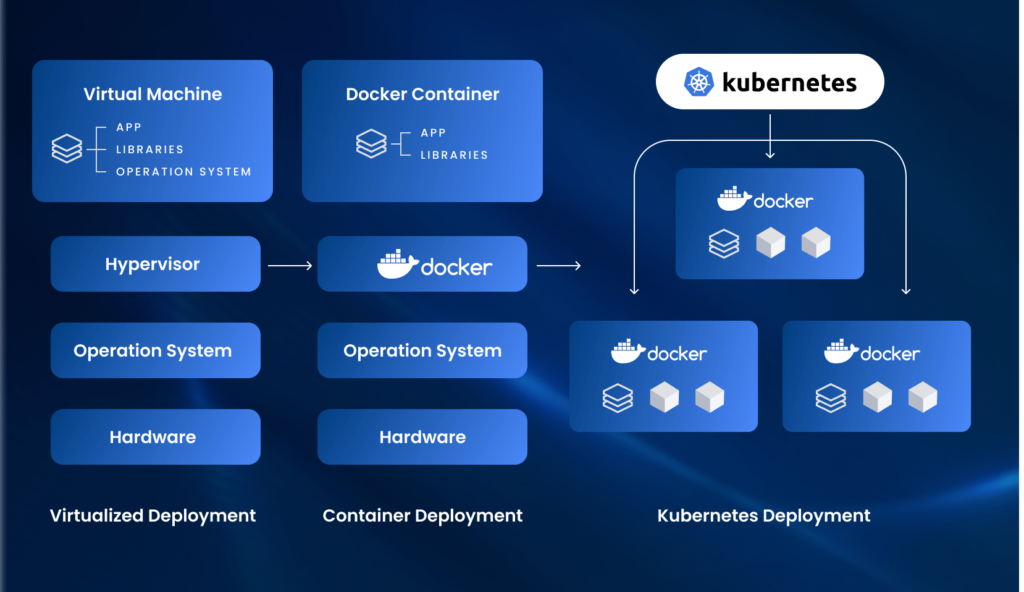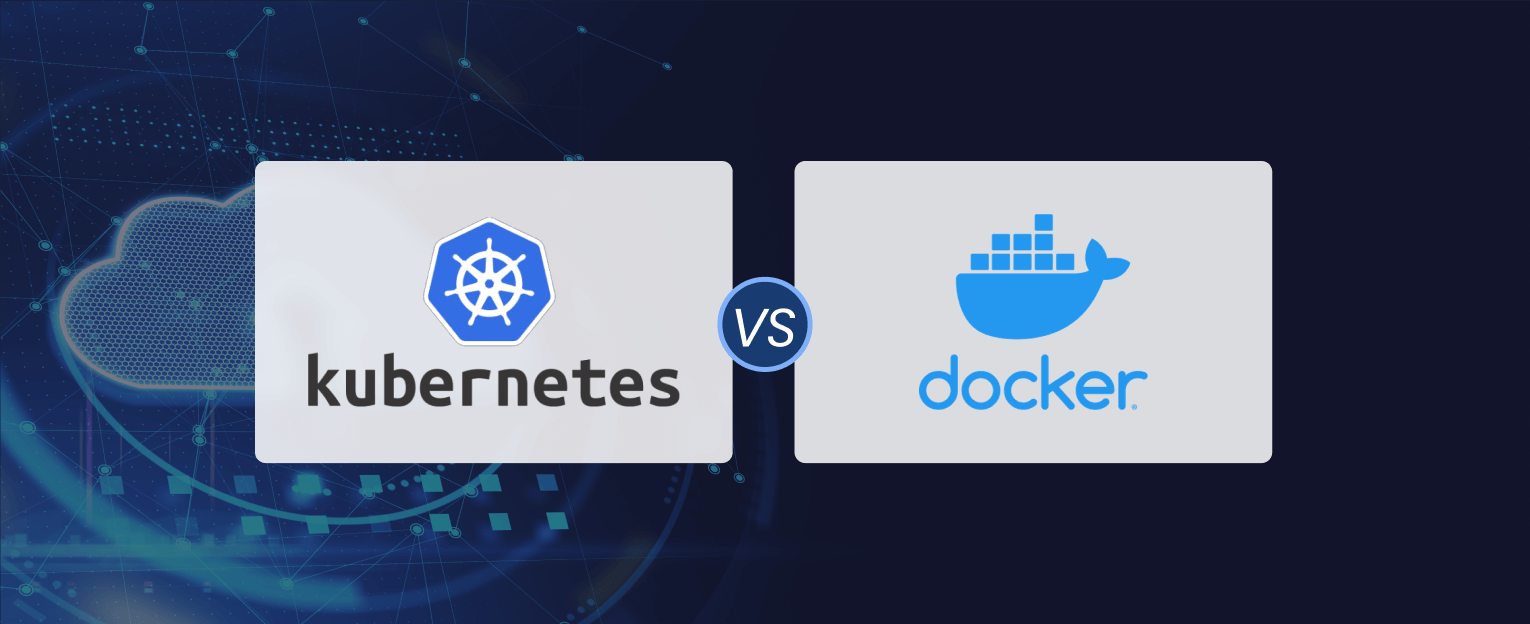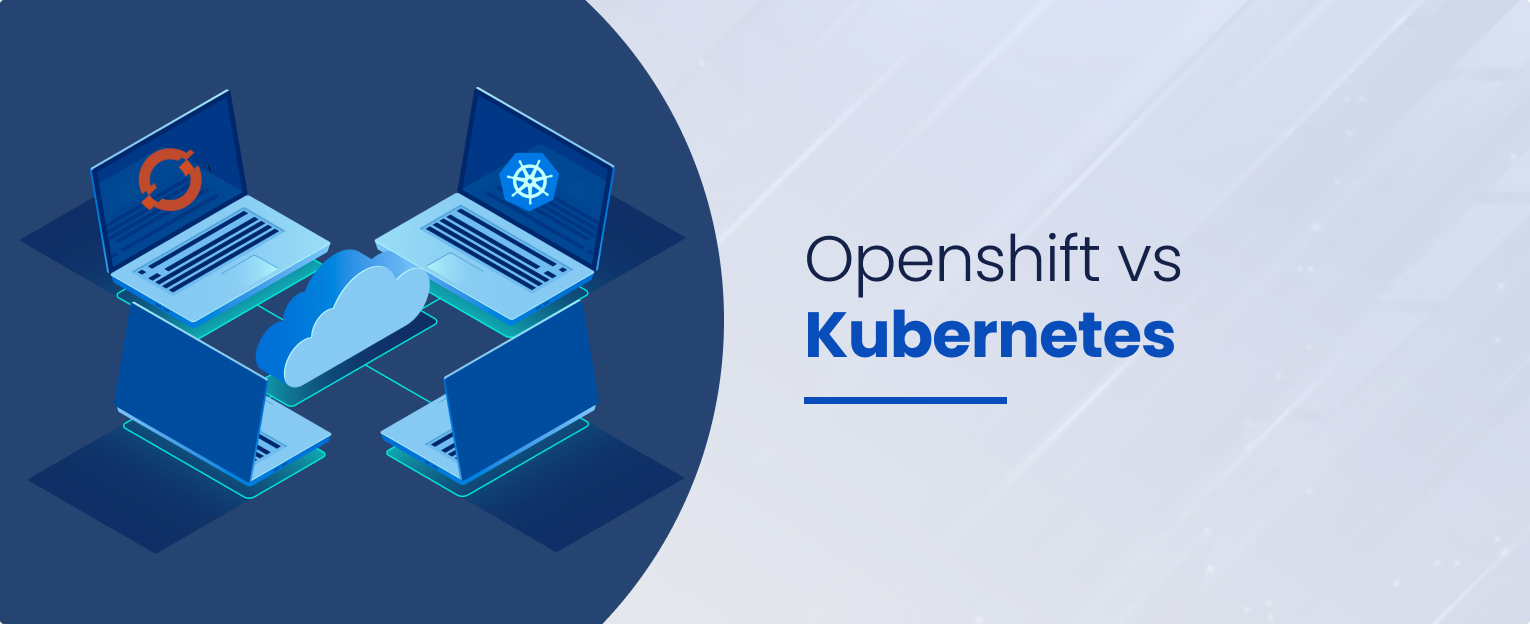To analyze Kubernetes vs Docker, we need to first understand what each of these tools actually does. While Kubernetes is an open-source platform that creates containerized workloads, Docker is a containerization platform that merges applications and their dependencies into containers for consistent execution.
Both applications have different purposes and functions, but their paths often cross. For example, Docker containers can run within a Kubernetes cluster, which makes the comparison between the two very interesting.
Kubernetes Overview
Kubernetes is an open container orchestration platform. By automating the deployment and scaling, they manage containerized applications. Kubernetes provides a resilient framework for orchestrating containers.
The main components of Kubernetes form a robust architecture. For instance, nodes are the underlying infrastructure that hosts the containers. Then there are Pods, the minors, and the most deployable units. Altogether, they encapsulate one or more containers and share resources.
Their deployments show the desired state of the application by managing updates and rollbacks. In comparison, their services enable communication between various parts of an application. Overall, it facilitates seamless connectivity.
Kubernetes are great at managing containerized applications at scale. The platform promotes the microservices architecture, enabling modular and independently deployable components.
While comparing Kubernetes vs Docker, it’s important to note that the former empowers organizations to embrace containerization. Resultantly, it offers a comprehensive solution for orchestrating containerized applications.
Docker Overview
Docker is a leading containerization platform. The system simplifies the process of developing, shipping and running applications. In other words, it encapsulates applications and their dependencies into lightweight and portable containers.
The aim is to maintain consistency across various environments. Its architecture revolves around the main components. One of them is Docker Engine.
It serves as the core, orchestrating container creation for deployment and management. Secondly, there’s Docker Images. They are lightweight, standalone, and executable packages. They contain application code and dependencies.
Portability is the most significant advantage of Docker. Containers package applications and dependencies make them easily transferable across different environments.
DevOps Containerization Services help organizations maximize this portability, ensuring seamless integration of containers into CI/CD pipelines and promoting scalable, efficient application delivery.
This portability supports consistent behavior from development to testing and production. The platform’s benefits position Docker as a powerful tool for modernizing software development.
Critical Differences Between Docker vs. Kubernetes
Here are the features that set Kubernetes and Docker apart from each other. Understanding these differences is crucial to see what makes one better than the other.
1. Scope and Functionality
Kubernetes is a large container orchestration platform. It is highly proficient to manage containerized applications across clusters of machines. It provides incredible benefits like loading, automatic scaling, and self-healing of applications.
On the other hand, Docker is a containerization platform that enables the packaging and distribution of applications using their dependencies. The main focus of Docker is to create lightweight, portable containers that can run across various environments.
2. Abstraction Level
Kubernetes has two different abstraction levels. It is great working at a higher level of abstraction. It can deal with the orchestration and management of entire applications as well as their components. It can remove the underlying infrastructure, allowing developers to focus on application logic.
It is essential to know that Docker operates at a lower level. The reason is apparent. This process is primarily concerned with containerization. Docker containers accelerate an application and its dependencies, too.
In the end, by providing a consistent runtime environment. Unlike Kubernetes, it is more focused on packaging and delivering applications.
3. Architecture
When it comes to architecture, Kubernetes functions differently. It follows a master-node architecture where the controller node manages the overall state of the cluster. At the same time, the worker nodes perform another duty, that is to execute tasks.
On the other hand, Docker uses a single-node architecture. This is where the Docker engine runs on a host machine. Now, where do multiple containers run? They run on this very host; Docker does not provide native clustering and orchestration features.
4. Use Cases
Another significant difference revolves around the use cases. Kubernetes is suitable for complex and multi-container applications deployed at scale. Its use cases are Ideal for large enterprises. The ones managing microservices architectures or applications needing high availability and scalability.
Conversely, Docker is ideal for developers. Plus, it is so helpful and convenient for small to medium-sized applications. They simplify the process of packaging and distributing applications. This makes it popular for development and testing environments.
Read more about most common ways to use Docker Cases in our detailed blog on Docker Use Cases.
5. Networking and Service Discovery
One of the best things about Kubernetes is its advanced networking features. It provides the built-in service discovery too. It also involves integrated DNS for service discovery and supports multiple network plugins for connecting containers.
The networking is simpler in Docker compared to Kubernetes. Docker renders a bridge network for communication between containers. But they have to be on the same host. In short, it allows for port mapping between the host and containers.
6. Ecosystem And Integration
Another significant effect is that Kubernetes boasts a vast ecosystem. It is accompanied by a rich set of APIs and many third-party tools and extensions. Furthermore, it integrates well with various cloud providers and supports a broader range of container runtimes.
For Docker, even though it has a considerable ecosystem, it’s more focused on the containerization aspect. The respective containers can be easily integrated into Kubernetes clusters. Meanwhile, Kubernetes itself can manage Docker containers alongside other container runtimes.
Kubernetes vs. Docker – Which One Is Best For You?

Both Kubernetes and Docker have a tremendous set of features. Now, the selection of the right one depends on the following factors.
You should pick Kubernetes when dealing with container management across multiple servers. Also, when handling them on a large scale, Kubernetes are advantageous at that point.
Its powerful orchestration capabilities enable efficient scaling and deployment of containers even in complex environments.
If you belong to an enterprise with sophisticated deployment needs, Kubernetes is the right choice for you as it offers significant power for intricate deployments. The initial investment in learning Kubernetes is outweighed by its ability to handle complex scenarios.
On the other hand, Docker and Docker Compose work differently. They are simpler alternatives that are suitable for local development. In addition to this, they are convenient for businesses with less complex deployments.
Secondly, the ease of use makes Docker a pragmatic choice for smaller-scale projects, and when simplicity is prioritized over extensive orchestration features. In summary, Docker excels at containerizing applications, making them portable and easy to manage locally.

Need Help in Selecting the right orchestration Platform?
Explore your options or seek guidance for implementing these technologies with Folio3! Our expert team offers personalized advice and tailored solutions to meet your business needs.
Conclusion
In essence, both Kubernetes and Docker, serve different purposes in the containerization landscape. Kubernetes excels in managing the orchestration and deployment of complex applications at scale.
On the other hand, Docker provides a simple and efficient way to package and distribute applications. However, there are also cases when Kubernetes and Docker can work together. The aim is to provide a comprehensive container solution.
To wrap up, Kubernetes vs. Docker comparison continues to play a significant role in the container orchestration field in 2025. Their different approach and features make them user-friendly for respective industries.
After discovering these fundamental differences, looking into the bigger picture of Kubernetes and Docker is easier. Now, you can analyze and decide which platform fits your needs.
- Frequently Asked Questions
Q1. What Is the Difference Between Kubernetes vs. Docker?
The major difference is that Docker focuses on individual container lifecycles, while Kubernetes handles larger container clusters at scale. Docker automates application deployment, scaling, and management within containers. Kubernetes efficiently orchestrates container distribution and scheduling across clusters.
Q2. Can Kubernetes Replace Docker?
It’s important to note that Kubernetes and Docker are not interchangeable, as they fulfill unique purposes in the container ecosystem. While they appear similar, they complement each other in developing and deploying containerized applications.
Q3.Which Is Better, Kubernetes or Docker?
Both Kubernetes and Docker offer unique benefits and are not mutually exclusive. Docker simplifies the process of application deployment. Meanwhile, Kubernetes is a powerful container orchestration system that manages large clusters.
Q4. Is Kubernetes Harder Than Docker?
Although both Kubernetes and Docker serve different purposes in containerization, Kubernetes has a steeper learning curve. As a container orchestration platform, its complexity arises from its wide range of functionalities. Docker is more straightforward as it focuses on creating and managing individual containers.







